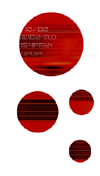

 |
 |
scientific program electroacoustic musics around set theory music analysis tools musicnetwork workshop professional week ircam forum workshops free software for music international multichannel sound forum performing arts and technologies dance and new technologies access to sound heritage thematic evenings demonstration stands artistic program set theory concert music in creation concert cursus concerts opera "one" sound installations open house weekend technologies gallery conferences demonstrations workshop-performances workshops and films ircam laboratories linux install-party concert distribution on internet associated events resonances night at glaz'art émilie simon at la cigale suguru goto reseaunances guided tours of ircam and the multimedia library resonances in pictures resonances 2002 
|
JOHN RAHNThe Swerve and the Flow : Music's Relationship to MathematicsAbstractAn historical dialog between philosophies of Being and those of Becoming also plays out in the history of music theory. This paper argues that artistic endeavor is bound up with Becoming and the Lucretian Swerve. Music theory has most often been essentialist, focusing on the frame and not the swerve. This is justifiable in compositional theory, but any analytical theory that sings alongside music needs to embody the flow and the swerve of artistic thought and experience. Schenker is paradigmatic in this respect, in spite of (and because of ) his neo-Plotinic mysticism. Other analytical theories attempt to model musical experience by playing with the syntax/structure model in ways that are often less subtle. American serial theory deriving from Milton Babbitt has been primarily compositional, rather than analytical. Allen Forte has elaborated an atonal analytical theory. David Lewin has formally articulated an important new analytical theory, both using and reacting against phenomenology in favor of a theory of acts and agents, and formally defining networks of transformational acts. The category theory implicit in Lewin's networks has recently been foregrounded by Guerino Mazzola. |
|||||||||||||||||||||||||||||||
 |
Organization Committee Copyright Ircam-Centre Pompidou 2003 |